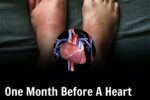9 Signs of Diabetes That Appear at Night: What You Need to Know!

Diabetes often sends silent signals before it’s officially diagnosed, and many of these signs tend to appear at night while you’re sleeping. Paying attention to what your body does after dark might just be the key to catching diabetes early.
Frequent urination
If you find yourself waking up multiple times during the night to use the bathroom, it may be more than just drinking too much water. High blood sugar causes your kidneys to work overtime, resulting in increased nighttime urination.
Excessive thirst
Waking up with a dry mouth or a desperate need for water could signal rising blood sugar levels. Your body is trying to flush out the extra sugar, which dehydrates you.
Night sweats
Even when it’s not hot, waking up drenched in sweat might be linked to blood sugar fluctuations. Low blood sugar at night can trigger sweating as the body reacts to the drop.
Restless sleep or insomnia
Diabetes can cause neuropathy (nerve damage), making it hard to stay asleep. Tingling or burning sensations in the legs or feet often disturb rest.
Unexplained fatigue
Feeling unusually exhausted at night or still tired after a full night’s sleep could be due to insulin resistance or poor glucose control.
Cramping or tingling in legs and feet
High blood sugar levels can affect nerves and circulation, especially in the lower limbs. These sensations may worsen at night due to inactivity.
Blurry vision during nighttime bathroom visits
Sudden blurred vision in dim lighting could indicate high blood sugar levels affecting your eye’s ability to focus.
Headaches in the morning
These may be caused by nighttime hypoglycemia — a drop in blood sugar while you sleep — leading to tension and pain upon waking.
Unexplained weight loss despite midnight hunger
Losing weight without trying, especially if combined with intense hunger during the night, may suggest your body isn’t absorbing glucose properly.
FAQs
Is it normal to pee 2–3 times a night?
Not usually. Waking up more than once regularly could signal diabetes or other health issues.
Can diabetes cause nightmares or vivid dreams?
Low blood sugar can lead to restless sleep, anxiety, and vivid dreams or nightmares.
Why do diabetics feel worse at night?
Nighttime fluctuations in blood sugar — either too high or too low — often worsen symptoms during sleep.
What should I do if I have several of these signs?
Don’t ignore them. A simple blood sugar test or HbA1c check can help identify the issue early before it becomes serious.
Listening to your body at night may just help you stay healthy during the day.






